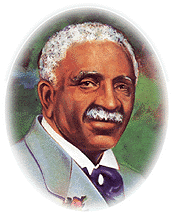
George Washington Carver
"Why Did You Make The Peanut?"
On an unrecorded date near the end of the Civil War,
George Washington Carver was born to a young slave girl named Mary. Those who saw the weak
and frail infant wondered if he would live. They had no way of knowing one day he would
grow to be one of the most influential men in American history.
While still a baby, George and his mother were abducted by
southern supporters from the Carver farm where they lived. Moses Carver, who owned Mary,
failed in his attempt to fight off the assailants. As a result, both were sold to
different men. A friend of the Carvers mounted a search and found George. However, Mary
could not be located. The child was returned to the farm where he was raised by Moses and
his wife, Susan.
Before his birth, George's father died in a farming
accident. An older brother, Jim, was his only known relative. Since they were childless,
Moses and Susan Carver treated the boys as if they were their own.
Those who knew the younger Carver realized something was
special about him. His love for nature and animals went beyond that of a child's normal
curiosity. He loved to take long walks in the woods, a habit he continued throughout his
life, collecting various insects and species of plants.
Carver once told his adoptive mother that he wanted to know
all there was to know about everything. "When just a mere tot, my very soul thirsted
for an education. I literally lived in the woods. I wanted to know every strange stone,
flower, insect, bird, or beast. No one could tell me. My only book was an old Webster's
Elementary Spelling Book. I would seek the answer here without satisfaction. I almost knew
the book by heart."
He accepted Christ when he was ten years old. "God just
came into my heart one afternoon while I was alone in the loft of our big barn."
Kneeling beside a barrel of corn, he prayed for Christ to become his Savior. "That
was my simple conversion, and I have tried to keep the faith," wrote Carver.
At fourteen, he left to attend the Lincoln School for
Colored Children in Neosho, Missouri. After he received his diploma, he moved to Fort
Scott, Kansas, where he entered high school.
In 1891, Carver enrolled in Simpson College to study piano
and art. Later he transferred to Iowa State College, where he received a B.S. Degree in
Agriculture. After receiving his Master of Agriculture, Carver joined the faculty of
Tuskegee Institute in Tuskegee, Alabama, a trade school founded by Booker T.
Washington.
His dream was to train and equip young black men and women
so they could be a vital part of the American work force. Carver admittedly had found his
calling in life. He remained on the Tuskegee faculty for forty-seven years where he helped
to shape the lives of innumerable students. He wrote: "I want [my students] to find
Jesus...How I long for each one to walk and talk with the Great Creator through the things
He has created."
In 1921 Carver was asked to appear before the U.S. House of
Representatives Committee on Ways and Means regarding tariff on the peanut. Biographer
Rupert Simms writes: "Southern farmers were pleading with congress for a tariff which
would place an import duty on peanuts produced abroad with cheap labor. Fearing the
devastation of their $200 million-a-year industry in peanuts, businessmen asked Carver to
argue their case....His presentation was so impressive that Congress asked him to speak
for one hour and forty-five minutes, rather than the customary ten, and they wrote the
tariff into the bill."
Overcoming the severest of odds, poverty and slavery, Carver
became one of the country's most respected agriculturists. In 1923 he received the
Springarn Medal for Distinguished Service to Science, and in 1939 he was awarded the
Roosevelt Medal for Outstanding Contribution to Southern Agriculture.
For years farmers in the south planted cotton without
rotating their crops. As a result, the soil became "worn out." Carver realized
something had to be done or the farmers would lose their land. He suggested crop rotation
and advised them to plant peanuts and sweet potatoes.
At first there wasn't a noticeable difference in farm
economy. Farmers continued to lose money. Seeking God through prayer, Carver asked:
"Mr. Creator, why did You make the peanut?"
God then led Carver to discover over 300 marketable products
made from the peanut, including mayonnaise, cheese, shampoo, instant coffee, flour, soap,
rubber, face powder, plastics, adhesives, axle grease, and pickles. From the sweet potato
Carver discovered over 150 different uses including library paste, vinegar, starch, shoe
blacking ink, and molasses.
Despite Carver's fame and achievements, racism was a
constant reminder of the social ills that plagued his society. Though forced to ride on
freight elevators and barred from many of the establishments his peers frequented, Carver
refused to become bitter.
His love and trust in Christ helped him conquer the negative
effects of poverty and racial prejudice. In the end, he earned the well-deserved respect
and admiration of his peers and the grateful acknowledgment of future generations. |
